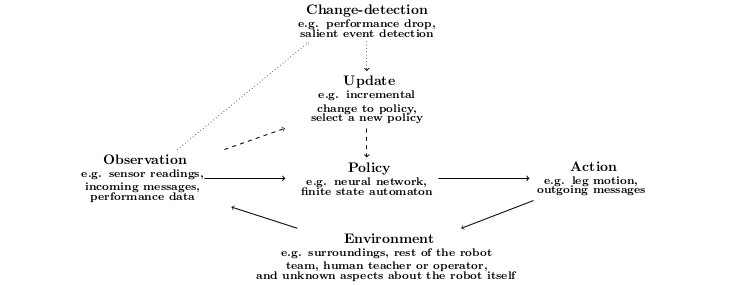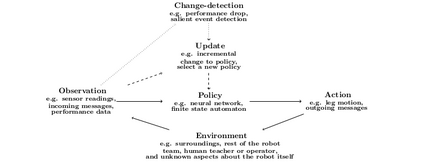Purpose of review: This paper reviews opportunities and challenges for decentralised control, change-detection, and learning in the context of resilient robot teams. Recent findings: Exogenous fault detection methods can provide a generic detection or a specific diagnosis with a recovery solution. Robot teams can perform active and distributed sensing for detecting changes in the environment, including identifying and tracking dynamic anomalies, as well as collaboratively mapping dynamic environments. Resilient methods for decentralised control have been developed in learning perception-action-communication loops, multi-agent reinforcement learning, embodied evolution, offline evolution with online adaptation, explicit task allocation, and stigmergy in swarm robotics. Summary: Remaining challenges for resilient robot teams are integrating change-detection and trial-and-error learning methods, obtaining reliable performance evaluations under constrained evaluation time, improving the safety of resilient robot teams, theoretical results demonstrating rapid adaptation to given environmental perturbations, and designing realistic and compelling case studies.
翻译:审查的目的:本文件回顾了在具有复原力的机器人团队中进行分散控制、变化检测和学习的机会和挑战。最近的调查结果:外生故障检测方法可以提供通用检测或特定诊断,并找到恢复解决方案。机器人团队可以进行积极和分布的遥感,以探测环境变化,包括查明和跟踪动态异常,以及协作绘制动态环境。在学习认知-行动-交流循环、多试剂强化学习、集成演进、网上适应的离线演化、明确任务分配和温室机器人的悬浮等方面,已经开发了分散控制的灵活方法。摘要:具有复原力的机器人团队面临的其余挑战是整合变化-探测和试验-感力学习方法,在有限的评价时间内获得可靠的绩效评估,提高具有复原力的机器人团队的安全性,理论结果表明快速适应环境扰动,以及设计现实和令人信服的案例研究。




